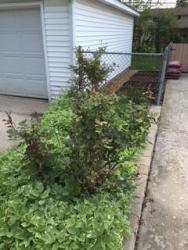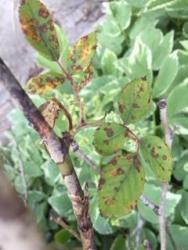Hi Susan ...
Thank you so much for the additional information. It really does help when we are trying to problem solve long distance ...

It does sound like you have spaced the roses far enough apart so that they are not competing with each other. Good work. The concrete surrounding the bed will increase the heat at the base of the roses in two ways that can cause stress to the plants. This is something that most people don't think about, but a friend of mine actually tested down in Los Angeles. Beds surrounded in hardscape, like concrete, are significantly hotter and dry out quicker on hot days than those that are surrounded by lawns and such and will stress roses planted in those beds. These beds need to be monitored for moisture and watered more deeply than we think they need to be watered.
Weeds or other plants do hold moisture in the soil during period of high temperatures. However, there is a downside. They also compete with roses for moisture/water and nutrients. Some are better competitors than others and are quite grabby and the roses lose out.
In my experience, mulch is a much better solution to manage moisture control rather than companion planting. That said, there are a lot of right ways to grow roses and others will have had good experiences growing plants in beds with their roses. However, I do have some concerns about your choice of "Devil's Weed.". I haven't used it in any of my gardens. Maybe Sue,
@sooby can help here.
I think that's our next step. We need to understand your companion plant. If it is aggressive as I think it may be, the starting point would be to clear the bed of that plant as much as possible and revitalize the soil with nutrients that the 'Devil's Weed' has gobbled up and mulch the bed well to conserve moisture and protect the rose roots from the heat of summer and nurture them back to health.
There are other steps we may need to take, too, but let's wait to hear back from Sue.

Elaine ... We cross posted ... we are thinking along the same lines. I just don't know anything about the ground cover ..


